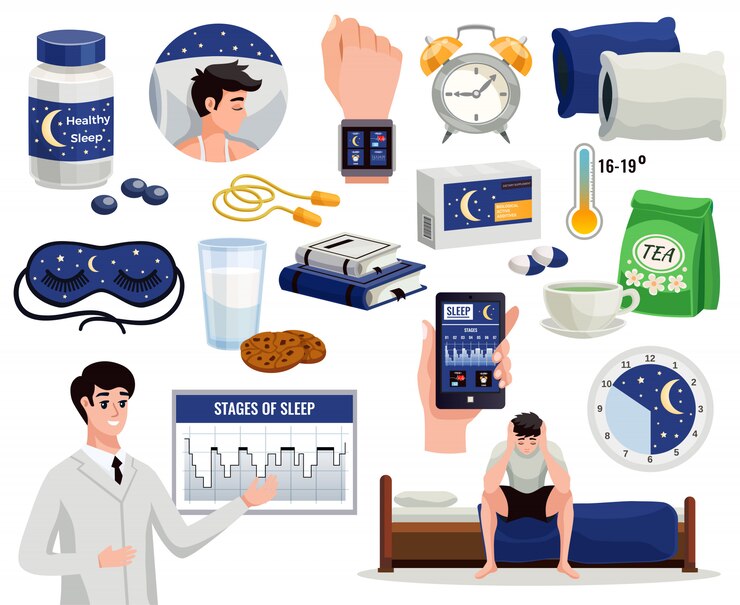Sleep hygiene refers to practices and habits that help improve the quality of your sleep.
It involves things like having a consistent sleep schedule, creating a comfortable sleep environment, and avoiding stimulants like caffeine close to bedtime.
Good sleep hygiene helps ensure that you get restful and restorative sleep, making it easier to fall asleep and wake up feeling refreshed.

Image by macrovector on Freepik
Improving sleep hygiene can significantly enhance the quality of your sleep and overall well-being.
Here’s a detailed guide on how to improve your sleep hygiene in 21 easy steps:
1. Maintain a Consistent Sleep Schedule
Go to bed and wake up at the same time every day, even on weekends.
Consistency reinforces your body’s internal clock, making it easier to fall asleep and wake up naturally.
2. Create a Relaxing Bedtime Routine
Develop a pre-sleep ritual to signal to your body that it’s time to wind down.
This could include activities such as reading, taking a warm bath, or practicing deep-breathing exercises.
3. Optimize Your Sleep Environment
Make sure your bedroom is conducive to sleep.
This means a cool, dark, and quiet environment.
Consider blackout curtains, earplugs, or white noise machines if necessary.
4. Invest in a Comfortable Mattress and Pillows
A comfortable mattress and supportive pillows are crucial for a good night’s sleep.
Ensure that your mattress is neither too soft nor too firm and that your pillows provide adequate support.
5. Limit Exposure to Screens Before Bed
The blue light emitted by phones, tablets, and computers can interfere with your body’s production of melatonin, a hormone that regulates sleep.
Try to avoid screens at least an hour before bedtime.
6. Be Mindful of Food and Drink
Avoid heavy meals, caffeine, and alcohol close to bedtime.
These can disrupt sleep patterns and lead to discomfort during the night.
7. Stay Active During the Day
Regular physical activity can promote better sleep, but try to avoid vigorous exercise close to bedtime.
Aim for at least 30 minutes of moderate exercise most days of the week.
8. Get Plenty of Daylight Exposure
Natural light helps regulate your sleep-wake cycle.
Spend time outside during daylight hours, especially in the morning, to help set your internal clock.
9. Manage Stress and Anxiety
High levels of stress and anxiety can interfere with your ability to fall and stay asleep.
Techniques such as mindfulness, meditation, or journaling can help manage stress.
10. Avoid Napping During the Day
If you need to nap, try to keep it short—20 to 30 minutes—and avoid napping late in the afternoon or evening, as it can interfere with nighttime sleep.
11. Keep Your Sleep Space Only for Sleep
Avoid using your bed for activities like watching TV or working.
This helps your brain associate the bed with sleep, making it easier to wind down.
12. Regulate Your Bedroom Temperature
Maintain a cool bedroom temperature, typically between 60-67°F (15-19°C).
A cooler environment helps lower your body temperature, which can promote sleep.
13. Use Relaxation Techniques
Incorporate relaxation techniques such as deep breathing, progressive muscle relaxation, or guided imagery to help calm your mind before bed.
14. Limit Liquid Intake Before Bed
To avoid waking up in the middle of the night for bathroom trips, try to limit fluids in the evening.
However, make sure to stay hydrated throughout the day.
15. Establish a Sleep-Friendly Evening Routine
Incorporate calming activities into your evening routine.
Reading a book, listening to soothing music, or practicing gentle stretches can help signal your body that it’s time to wind down.
16. Avoid Stimulants in the Evening
Be mindful of stimulants such as nicotine and certain medications that can disrupt sleep.
If you have concerns, discuss them with your healthcare provider.
17. Create a Sleep-Inducing Atmosphere
Consider adding elements that promote relaxation, such as essential oils (lavender is known for its calming properties), soft lighting, or comfortable bedding.
18. Keep a Sleep Diary
Track your sleep patterns and habits in a sleep diary.
Note what time you go to bed, wake up, and any nighttime awakenings.
This can help identify patterns or problems that need addressing.
19. Address Sleep Disorders
If you suspect you have a sleep disorder such as insomnia or sleep apnea, seek professional help.
A healthcare provider can offer guidance and potential treatments.
20. Limit Evening Stimulation
Avoid engaging in stimulating activities before bed, such as intense discussions, exciting TV shows, or demanding work tasks.
Choose relaxing activities instead.
21. Be Patient and Persistent
Improving sleep hygiene takes time.
Be patient with yourself as you implement these changes, and persistently follow your new sleep habits to see long-term benefits.
Conclusion
Improving your sleep hygiene involves a combination of establishing consistent habits, creating a conducive sleep environment, and managing daily activities that affect your sleep.
By following these 21 steps, you can enhance the quality of your sleep and improve your overall health and well-being.
Remember, it’s about finding what works best for you and sticking with it.
